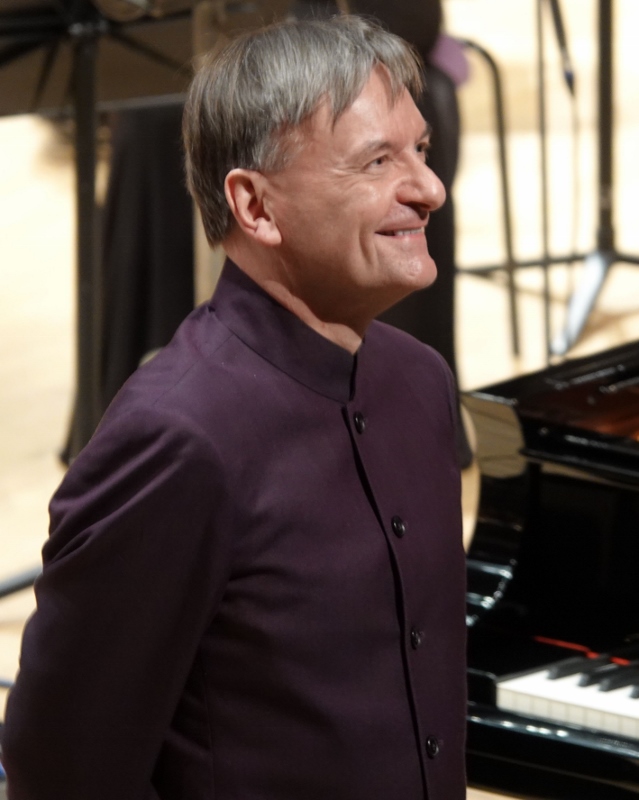There was something extraordinarily powerful and moving about Saturday’s Beethoven commemoration concert by the BBC Philharmonic and its chief conductor, Omer Meir Wellber.
Originally planned for 2020 but of course postponed, its second part consisted of a UK premiere: a work co-commissioned by the BBC to be the opening of something quite novel. Wellber told the audience it would be like “a symphonic poem by Beethoven”. He meant that Ella Milch-Sheriff’s The Eternal Stranger would be followed without any break by both the Funeral March from Beethoven’s “Eroica” symphony and then (again with no break) the Leonore No. 3 overture.
Contrived? A violation of the sanctity of the master’s original works? Not a bit of it. What came through loud and clear was the abiding relevance of Beethoven’s passionate visions of what heroism and fighting for freedom against oppression really mean. It could not have been more relevant to today’s world if it had been planned yesterday.
 Beethoven is worth commemorating any time, anyway. And so the performance of the Third Piano Concerto, with Stephen Hough (pictured) as soloist, proved at the start. His reading of the work is individual, nuanced, brilliant, and never less than stimulating, With just 40 strings on stage (and a return to “normal” spacing and shared music stands for the desks, unlike a week ago in the same hall), and under Wellber’s baton, the orchestral playing was lively, precise, energetic and dynamically highly varied. Hough very rarely expects anyone to follow him down unfamiliar paths, but once he gets a theme in solo guise – and even more so once he has his cadenza to take hold of – he brings subtle little surprises and enormously effective tempo flexibility into play and shows us just how Romantically mysterious Beethoven’s writing can sound.
Beethoven is worth commemorating any time, anyway. And so the performance of the Third Piano Concerto, with Stephen Hough (pictured) as soloist, proved at the start. His reading of the work is individual, nuanced, brilliant, and never less than stimulating, With just 40 strings on stage (and a return to “normal” spacing and shared music stands for the desks, unlike a week ago in the same hall), and under Wellber’s baton, the orchestral playing was lively, precise, energetic and dynamically highly varied. Hough very rarely expects anyone to follow him down unfamiliar paths, but once he gets a theme in solo guise – and even more so once he has his cadenza to take hold of – he brings subtle little surprises and enormously effective tempo flexibility into play and shows us just how Romantically mysterious Beethoven’s writing can sound.
The Largo second movement was stately in its melancholy, and conductor and soloist together made the finale playful, with precision in its counterpoint and almost Haydn-esque in its sense of fun. Just once was the bouncing pace in danger of running away with itself, but that was firmly dealt with, just in time.
So far, so much an illuminating vision of great music. But something more important was to come. First, Wellber announced that there would be an encore: but in the form of a piano duet by Stephen Hough and himself (he is a pianist of solo status as well as conductor). It was music from Ukraine – two songs simply rendered by the two musicians and dedicated to the people of Ukraine and in particular to the BBC Philharmonic’s long-time, much-loved leader, Yuri Torchinsky, himself Ukrainian and performing as immaculately as ever in the leader’s chair for this performance.
If that didn’t stir emotions enough, the UK premiere of The Eternal Stranger and the Beethoven pieces was certain to do so. Its conception was based on something recorded in one of Beethoven’s letters: he told his friend and publisher Tobias Haslinger that he’d had a dream in which he journeyed to the East – Syria, India, Arabia and Jerusalem – and in Jerusalem his friend himself appeared. Israeli author Joshua Sobol wrote a poem based on this, and in turn it inspired Milch-Sheriff to compose, using parts of the poem telling of someone, possibly a refugee, in an unknown, hostile environment, and remembering Beethoven’s own experience of being an odd one out, lonely and considered a “stranger”.
The new work has a narrator, in this case Eli Danker, who brought it to life by moving around the platform and finally leaving it for the stalls, at one point laying out what seemed a kind of prayer mat, and joining in with some drumming as well as reciting the almost rap-like rhythmic lines of the poem (in German) in measure with the music.
The musical writing is approachable, making references to Arabic and Jewish themes and to Beethoven, but in a way that’s quite unselfconscious and never over-clever: to an English-speaking audience the textual details of the poem may not all be obvious but the overall impression is clear enough, and for today its message is very much about the tragedy of war and the plight of the refugee.
To follow that with the “Eroica” funeral march, seguéd in simply as an expression of mourning, and then Leonore No. 3 (again seguéd), was full of meaning. Beethoven’s vision of the triumph of love and freedom speaks through the years.















Add comment